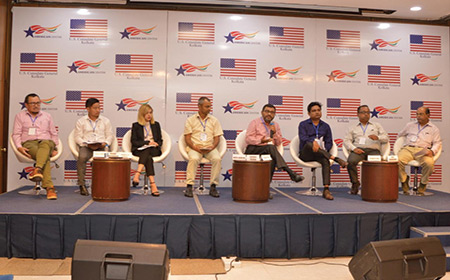Staff Reporter
KOLKATA, Aug 31: Journalists of South Asian countries pledged to promote cross-border journalism and collaborative reporting, and to strengthen data-driven investigative reporting, during a two-day workshop on ‘Regional security in the era of digital media’, which was held here in West Bengal from 29-30 August.
The workshop was organised by the US consulate general here, in collaboration with the CUTS International and the East-West Centre (EWC), at the American Centre of the consulate general.
Media persons from South Asian countries such as Nepal, Sri Lanka, Bangladesh, Bhutan and India who
participated in the workshop vowed to advocate cross-border journalism, collaborative reporting, promotion of media literacy, combating disinformation, strengthening investigative journalism, and creating a strong network of informed media in the region.
The preparation of the National Register of Citizens in Assam and its regional and potential demographic impact took the centre stage during the session. Trafficking, drugs, environment degradation, illegal mining and cross-borders trade were also discussed, besides regional security in the era of digital media.
The workshop also focused on reinforcing a positive counter-narrative to address security issues in the region, and promoting an open and stable Indo-Pacific region. It also highlighted the serious threat that misinformation and disinformation pose to democracies and peoples across the borders through social media.
Addressing the inaugural session on Thursday, Kolkata US Consulate General Patti Hoffman described the workshop as a great initiative, and said the US government is committed to ensuring freedom of the press.
She said safeguarding the freedom of the press “is a constant struggle through the world. We know that in authoritarian states, a lot of misinformation is used to create authoritarianism in several ways.”
Hoffman said the US consulate’s aim is to “increase access to credible, independent media; enhance media literacy and information; strengthen commitment to a free and open digital regulatory environment; support in-depth investigative journalism; and create public awareness on the dangers of corruption,” adding that free internet is a part of the US’ Indo-Pacific policies.
“New digital platforms have unleashed investigative journalistic practices that have a greater global reach now than at any point of human history. But on the other hand, disinformation and fake news are affecting across the borders,” she said.
In order to maintain an open democratic system, it is important that the government, business establishments, media outlets and consumers work together to solve this problem (of fake news), Hoffman said.
“The government should promote news literacy and strong, professional journalism in their society; the news industries must provide high quality journalism in order to build public trust and correct fake news and disinformation; and technology companies should invest on tools to identify fake news and reduce financial incentives to those who profit from disinformation,” she said.
EWC Director Satu Limaye said the workshop “allowed us to work with new (press) communities, create new linkages between Myanmar, Thailand, Nepal, India, Bangladesh and Sri Lanka, and new opportunities to work in connectivity.”
The EWC (or the Centre for Cultural and Technical Interchange between East and West) is an education and research organization established by the US Congress in 1960 to strengthen relations and understanding among the peoples and nations of Asia, the Pacific, and the United States. It is headquartered in Honolulu, Hawaii.

